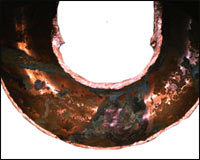Guitar strings are one of the most important parts of a guitar- so knowing how they work is vital to getting the tone and control that is desired. Different gauges, materials, construction, and string condition can all have a big impact on the sound of a guitar.

Figure 1 – Look familiar? This is your guitar string up close! Notice how the metal is wound into string.
Tone is dependant upon the gauge of a string (diameter), among other things. Heavy strings have greater tension than lighter strings, and have more sustain, although they are more difficult to bend. Of course, heavy strings are needed for thicker and heavier sounds. Before purchasing guitar strings, it should be noted that there are many gauges to choose from – from super light, to super heavy – and that using a different gauge strings can have a significant impact on guitar tone. Different thickness guitar picks sometimes need to be tried out, if a change is made to string gauge.
Steel is usually either the basic material strings are made of, or are the center of the material. For instance, nickel plating is usually attached to steel for a different sounding tone. Silk or nylon has been used to coat strings as well- and the wealthy can enjoy gold plated strings. Most strings are round wound, which means that a rounded wire was used to create the string. Otherwise, there is what’s called flat-wound strings that are much smoother- and bass guitars often use them.

Figure 2 – For those who have the money, gold strings offer great tone.
Since strings are made of metallic materials, they are subject to rust and oxidization. Most guitar cleaning liquids can help prevent sweat and other means of possible rust reagents from damaging strings. A rusted string will sound much less appealing than a clean one- so it is important to take care of strings. While it isn’t completely necessary to buy cleaner, cleaning guitar strings after play is recommended.
New strings can be very difficult to work with, since they stretch. Just like rope would, wound wire will inevitably be quite inconsistent. However, this will change with “breaking them in”. During this process, a lot of tuning work may have to be done on the guitar in question- and purposely stretching them may be necessay. It usually may take anywhere from a day to a week to break in a set of strings, depending on how often they are played and retuned.

Figure 3 – Rusted string can dampen sound, and ruin tone. They appear as dark spots, and can be prevented through hand washing or cleaning strings after use.
Shopping for guitar strings is easy, changing them is a different matter altogether. Carefully taking old strings off and putting new ones on can take up to half an hour. Professionals can usually do the job within 15 minutes at top speed. There are many guides to change guitar strings, and most of them are free. Local musicians and stores can also be a great help when trying to replace guitar strings.
There are so many variables when buying new strings, its probably best to try several types, by different manufacturers to see what works. But for best tone, buy the heaviest gauge strings that will allow you to play normally; that includes bends, chords, vibrato etc. Too light strings might make for easy playing, but won’t have the same power or tonal quality

Thanks for this great summary – I love the thick sound of heavy strings myself. They’re a little harder on the fingers, but it’s totally worth it.